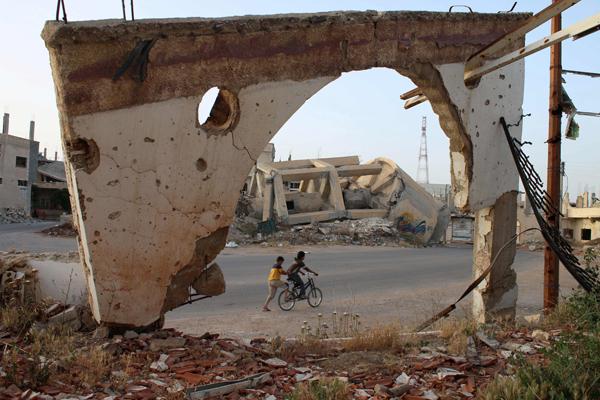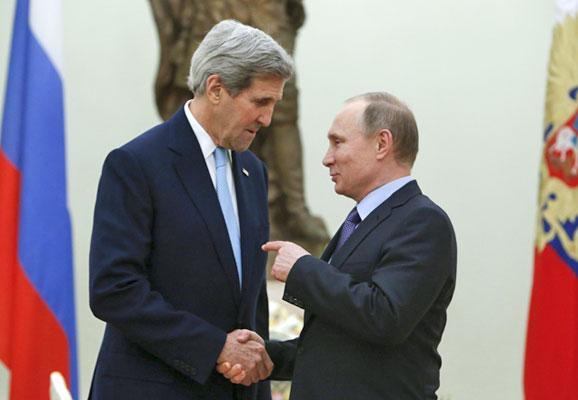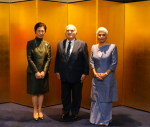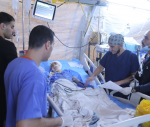You are here
Attention turns to Moscow, Riyadh as parties seek Syria ceasefire
By Agencies - Dec 19,2015 - Last updated at Dec 19,2015
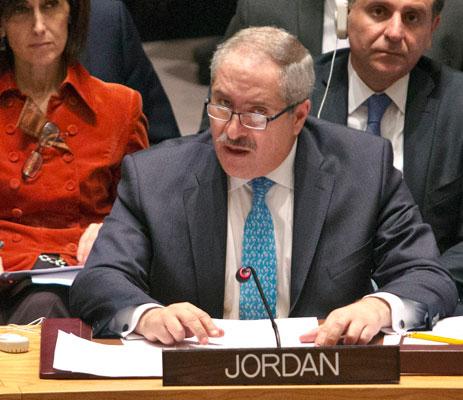
Deputy Prime Minister and Foreign Minister Nasser Judeh addresses a gathering of foreign ministers at the UN Security Council on Friday, following a vote on a draft resolution concerning Syria (AP photo by Bebeto Matthews)
The UN Security Council threw its unanimous support Friday behind a plan to end Syria's brutal civil war by summoning rebels and the regime to the negotiating table, Agence France-Presse reported Saturday.
The US and Russian initiative, which emerged from talks with a 17-nation group, foresees a rapid ceasefire in the almost five-year conflict, perhaps as early as next month.
If the plan brings President Bashar Assad's regime to the table with the armed opposition, it will allow Russian and US-led forces to focus their firepower on Daesh.
"In January, we hope and expect to be at the table and to be able to implement a full ceasefire," US Secretary of State John Kerry told reporters.
"And that means all the barrel bombs will stop, all the bombing, all the shooting, all the attacks on either side."
The Security Council met Friday after the latest round of talks by the International Syria Support Group (ISSG), which had gathered in New York to renew its push for peace.
Attention now turns to Moscow and Riyadh, as Russia pressures Assad's regime to agree to a ceasefire and Saudi Arabia wrangles the opposition to form a negotiating team.
The UN special envoy on the conflict, Staffan de Mistura, said he would send out invitations to talks in January.
The United States and Arab allies remain convinced Assad must leave office as part of the process, but his allies Moscow and Tehran insist this is a decision for the Syrian people.
The resolution does not touch on this vital issue.
Jordan
Describing the resolution as “historic”, during his participation at the Security Council meeting Friday, Deputy Prime Minister and Foreign Minister Nasser Judeh said that international efforts resulted in the establishment of the ISSG, which will continue its work to facilitate a political transition according to Geneva 1, the group’s meetings and the council’s resolution on Friday.
He also added that the Kingdom, since the beginning of the crisis in Syria, has always said that the comprehensive political solution is the only one for Syria, the Jordan News Agency, Petra, reported.
Meanwhile, Finance Minister Omar Malhas commended another Security Council resolution related to combating financing terrorism, noting that the terrorist crimes perpetrated by such organisations prove their followers “seek to destroy shared values”, Petra reported.
Malhas said that Jordan has always stressed the importance of fighting terrorism financing and draining its resources, adding it is a main pillar in any comprehensive effort aimed at combating terrorism.
Terror list
According to AFP, Judeh presented a draft list of “terrorist” groups that the ISSG nations will agree to exclude from the talks.
This would include, but may not be limited to, Daesh and the Al-Qaeda-linked Al-Nusra Front.
Kerry said that there were still sharp disagreements between the ISSG parties, some of which sponsor armed factions on the ground, as to which groups should be banned.
“There was a very rigorous discussion this morning, as you might imagine, about who might or might not qualify as a terrorist,” he said.
He said it was “impossible to reach consensus” in the time available and that other countries would now help Jordan redraft the list in the weeks to come.
Iran said it would work with Russia, Oman, Egypt, Turkey, Jordan and France to prepare a list of extremist groups it wants to see banned from talks.
“Terrorist groups have no place in this national dialogue,” Deputy Foreign Minister Hossein Amir Abdollahian was quoted by the official IRNA news agency as saying.
Massacred so many’
“Only a Syrian-led, inclusive dialogue can put an end to the untold suffering of the Syrian people,” Russian Foreign Minister Sergei Lavrov warned the Security Council.
Nevertheless, Kerry — who has “agreed to disagree” with Moscow on Assad’s fate — said the vote would act as a springboard for forging ahead with peace talks.
He emphasised that victory over Daesh hinges on a peaceful settlement in the broader Syrian civil war.
“We know that Daesh can never be allowed to gain control in Syria so we have a global imperative here to deal with a terrorist entity but also to end the civil war,” he said.
“President Assad in our judgement has lost the ability, the credibility to be able to unite the country and to provide the moral credibility to be able to govern it.”
Kerry said that most ISSG members agreed that Assad would have to go, and many said so, notably France.
“How could somebody bring together a whole people when he has massacred so many?” Foreign Minister Laurent Fabius demanded.
The resolution enshrines the plan developed by the ISSG countries in a series of meetings in Geneva and Vienna.
“We have a time frame. That transitional process needs to try to be achieved within the target time of six months,” Kerry said, arguing that the UN vote gave the plan legal force.
“The election needs to take place within 18 months, the same start time, so that after six months of the transition you’re about a year away, or less, from an election.”
British Foreign Secretary Philip Hammond hailed the plan as a “great step forward”.
‘Unrealistic’ timetable
Syria’s main opposition group, the Syrian National Coalition, warned that hopes for a ceasefire by January 1 were unrealistic and demanded that Russia halt its air strikes as part of that truce.
Najib Ghadbian, the SNC’s envoy to the United Nations, said opposition groups need “a month or so” to prepare for the political talks that would begin in tandem with a ceasefire.
And, on the eve of the talks, Assad warned in an interview with Dutch television that misguided efforts to bring about regime change would make the conflict “drag on”.
Assad responded with sarcasm when asked whether he was comforted that Washington’s stance on his departure had seemingly softened.
“I was packing my luggage. I had to leave, but now I can stay,” he joked.
Related Articles
WASHINGTON — First a ceasefire in Syria, then aid and then — who knows — perhaps a political transition?
MOSCOW — Russia and the United States said that a planned international meeting on the Syrian crisis would take place in New York on Friday,
AMMAN — US Secretary of State John Kerry on Sunday announced reaching a “provisional agreement” to cease fire in Syria, following a phone ca


